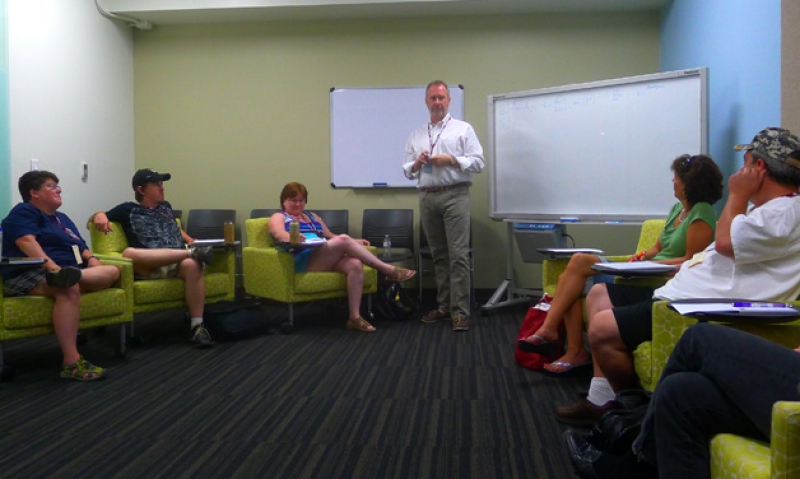
Symposium gives veterans ‘creative therapy’
Earlier this month, around 120 veterans, military spouses and volunteers convened at Eastern Kentucky University (EKU) in Richmond to participate in the Military Experience and the Arts Symposium, a one-of-a-kind rehabilitation event that helped former and current servicemembers tell their stories of war and military experience through art and the written word. Legionnaire Travis Martin organized the three-day symposium, held July 5-7, to give veterans a chance to express themselves through “creative therapy” workshops, which focused on writing, visual or performative expressions.
All 65 veterans in attendance received free lodging, meals, texts and supplies. The event, funded mostly by the Kentucky Department of Veterans Affairs, welcomed veterans from all over the country and from service eras dating as far back as the Korean War.
“The generosity of the (Kentucky Department of Veterans Affairs), other financial and in-kind sponsors, and Eastern Kentucky University made this event possible,” Martin said. “The veterans themselves made it special. I could not have dreamed up a better atmosphere. The veterans were hungry to learn and create; their sense of camaraderie forged new, lifelong friendships; and each one opened windows into their pasts, offering unique vantage points to understand the nature of military service.”
Attendees participated in one-on-one creative consultation sessions and other therapeutic initiatives during the day. At night, the focus turned to bridging the gap between the military and the civilians on hand. Attendees read their creative works to audiences assembled at the school, and plays and other shows that centered on the military experience were performed. Speakers also addressed the audience on veterans and military issues.
“The Military Experience and the Arts Symposium reaffirmed the therapeutic power of the creative arts in healing the invisible wounds of military service,” said Brett Morris, director of veterans affairs and admissions at the university. “I’m delighted that EKU was able to play a substantial role in bringing this experience for free to so many veterans from across the country.”
Michelle Monte, a member of Post 325 in Goodman, Wis., traveled more than 700 miles for the symposium. Monte, who has PTSD related to a military sexual trauma incident, found the event especially therapeutic because of her background as a writer and the master’s degree she holds in English.
“I attended the symposium at the urging of a friend,” said Monte, who had stopped writing because she found it too stressful. “I was surrounded by other veterans who didn’t classify me by disability, combat status or gender. We all served our country, end of discussion. Since attending and connecting with such an incredible group of people, I have written nearly a dozen pages of prose. I have done several sketches. I continue to stay in contact with my new friends. I have made a few realizations about my situation that have advanced my healing process.”
The symposium, which Martin says will be an annual occurrence each summer at EKU, coincided with the release of the school’s Journal of Military Experience (JME) - a collection of writings from servicemembers and veterans about their experiences in the military. The American Legion profiled the first volume of the journal last summer.
“After working with student veterans on the first Journal of Military Experience, I learned how important it is to veterans to hear their stories told,” said Martin, who is also JME’s editor. “I also learned that providing them with tools and access to different forms of expression is key. For the last year, we worked on the second JME with veteran authors and artists all over the country. This symposium was our attempt to do the same kind of work – one-on-one collaboration, mentorship and facilitation – with veterans on a grander scale.”
